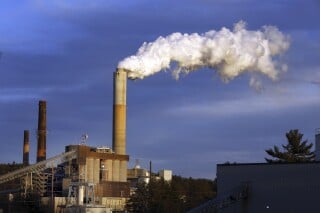
SBTI research deems carbon offsets are largely ineffective
What's going on in the world of ESG, CSRD, CSDDD, SDGs etc...
1. SBTI RESEARCH DEEMS CARBON OFFSETS LARGELY INEFFECTIVE
Donal Daly, Future Planet CEO, reported here previously that SBTi was thinking about using offsets in their calculations. That may now be problematic.
Staff at SBTi have now found that carbon offsets are largely ineffective. The findings are subject to further review, but if upheld, would be a major obstacle to the adoption of carbon offsets as part of companies' emission reduction plans.
At stake is the growth of the market for voluntary carbon offsets. Many of the SBTi's backers, including the Bezos Earth Fund, are pushing for adoption, as is former U.S. climate envoy John Kerry. They argue offsets will spur investment in clean energy.
Coincidentally, Amazon missed its SBTi targets this year. Offsets would help them.
Reference: https://tinyurl.com/36h8tzjd
2. NO EASY WAY TO SAY THIS: THE FUTURE IS +2.5C (PROBABLY)
We expect you will already have read about this; but it is too important to omit from here.
Hundreds of scientists expect global temps to rise to at least 2.5°C above preindustrial levels this century, blasting past agreed targets and causing catastrophic consequences.
Almost 80% of the respondents in The Guardian newspaper survey, all from the authoritative Intergovernmental Panel on Climate Change (IPCC), foresee 2.5°C+ of global heating, while almost half anticipate at least 3°C.
This is not the time to give up. Fractions of a degree do matter; every extra tenth means 140 million more people suffer in dangerous heat.
Europe is heating up faster than elsewhere. This must be a critical consideration in your local, national, and European elections.
Act now. We have nothing more to say.
Reference: https://tinyurl.com/23j9h6cv
3. 78% OF SINGAPORE SMES LOSE BUSINESS OVER EMISSIONS REPORTING
Foretelling the impact of ESG on businesses worldwide, six out of 10 business leaders reported losing existing or prospective new business owing to stringent emissions reporting, according to Schneider Electric.
For SMEs, it is worse. 78% report a loss in business owing to compliance issues. This compares with 52% for large companies. Despite gaps in supply chain emissions data however, the study also found that Singapore businesses are pressing forward with taking a range of measures to green their supply chains, according to Schneider Electric.
Almost half of overall business leaders agree that it will become “significantly more expensive” to do business due to increased emissions reduction needs in supply chains. Lack of technology is highlighted as a key barrier for 53% of businesses.
I am seeing this every day. A sustainability software platform is the only way to get ahead of this. (I know I am biased.)
4. TRUMP ASKS BIG OIL FOR $1B IN EXCHANGE FOR CLIMATE POLICY
A bombshell Washington Post report shares details from a dinner at Mar-a-Lago where the former president rubbed shoulders with oil executives and lobbyists last month.
Sources say Donald Trump told the attendees to raise $1billion to help him take back the White House, and in return, he promised to: 'Reverse the pause on liquified natural gas (LNG) export terminal permits on “the first day”'; increase auctions for oil drilling in the Gulf of Mexico and green light Alaskan oil drilling; and ditch emissions targets for car manufacturers that are projected to spur on the EV transition.
Seems like a pretty severe climate risk!
Reference: https://www.washingtonpost.com/politics/2024/05/09/trump-oil-industry-campaign-money/
5. SOLAR AND BATTERY LEVELS ALIGNED WITH NET ZERO TRAJECTORY
Global manufacturing rates for solar PV are already matching the capacity needed for a net-zero scenario in 2030, according to new research. Investment into green technology increased by 70% last year.
The report from the International Energy Agency (IEA) analysed spending and capacity deployment of solar PV, wind, batteries, electrolysers and heat pumps.
It found that spending on these solutions reached $200 billon globally in 2023 - a 70% increase on 2022.
The IEA says spending on solar PV manufacturing is aligned with the levels needed by 2030 to meet a net-zero scenario.
This is very positive. Stay the course.
Reference: https://www.edie.net/solar-and-battery-manufacturing-levels-aligned-with-net-zero-trajectories
6. VERMONT FIRST STATE TO CHARGE BIG OIL FOR CLIMATE DAMAGE
In a move that could start a tsunami that could overwhelm, or at significantly impact, Big Oil’s climate crimes, Vermont is poised to pass a ground-breaking measure forcing major polluting companies to help pay for damages caused by the climate crisis. This move is being closely watched by other states, including New York and California.
Modelled after the Environmental Protection Agency's (EPA) Superfund Program, which forces companies to pay for toxic waste clean-up, this superfund bill would charge fossil fuel companies billions of dollars for their past emissions in VT.
I am a huge fan of the 'Polluter Pays' principle. If it can be enacted in Vermont, then why not everywhere else in the U.S. and then globally?
Reference: https://tinyurl.com/44p9h2rp
7. OIL AND GAS INDUSTRY PUMPING PROPAGANDA INTO SCHOOLS
This is oil and gas (o&g) propaganda at its finest. The school lesson plan, for the 8-10 age group in the U.S., is titled 'A Day Without'. It instructs teachers to explain to their classes how oil and gas provide most of the energy children use in their day-to-day lives, from 'charging my computer' to 'making popcorn'.
Students are asked then to imagine life with no oil and gas - 'Now that you know where this energy comes from, imagine if these sources didn’t exist! What would life be like?'. There is no info in the lesson plan on the damage to health, or the environment, caused by oil and gas.
At the bottom of the lesson plan is the logo of the American Petroleum Institute (API), the O&G lobbying group, with a long history of climate denial. Shocked?
Reference: https://drilled.media/news/discovery-education
8. G7 REACHED DEAL TO EXIT COAL BY 2035 WITH SOME LEEWAY
Energy ministers from the G7 will sign a deal to end the use of coal in power generation between 2030 and 2035, but could offer some leeway to Germany and Japan.
G7 countries will pledge to shut down their coal-fired plants in the first half of the 2030s but may also say countries could opt for a date consistent with keeping a limit of 1.5°C global temperature rise within reach.
This gives some leeway to Berlin and Tokyo, whose coal-fired plants produce more than one-fourth of their total electricity.
Germany has written into its legislation a final target to shut coal plants by 2038 at the latest, while Japan has not set a date.
It is still all good news.
9. MORE THAN A THIRD OF S&P 500 LINK CLIMATE TO COMPENSATION
The main drivers of climate change for most companies seem to be either financial incentives or regulations. If that is true, then this news from S&P is good news.
More than a third of S&P 500 companies have monetary incentives in place linked to emissions reduction. Fewer have climate-related compensation incentives for senior executives, and even fewer at the top executive ranks, according to a new study released by S&P Global.
Less than half of large listed companies in the U.S. have set net zero targets, and goals focus primarily on Scope 1 and 2 emissions, with much lower ambitions on Scope 3 – the bulk of most companies’ carbon footprints.
Good news, some bad, but overall progress.
Reference: https://tinyurl.com/nhn8yk8e
10. EPA LOOKS FOR MORE TRANSPARENT O&G METHANE REPORTING
The U.S. Environmental Protection Agency (EPA) announced that it is strengthening and expanding methane emissions reporting for oil and gas facility owners and operators and improving the quality of emissions data reported through advanced technologies.
Rapid reduction in methane emissions is seen as one of the most effective near-term actions that can be taken in order to help achieve the global climate goal to limit warming to 1.5°C. Methane is extremely potent, with as much as 80x the warming power of CO2. O&G facilities are the largest U.S. industrial source of methane emissions.
Methane is really the most urgent problem to solve for the next two-to-five years, so this extra vigilance is most welcome.
Reference: https://www.esgtoday.com/epa-boosts-emissions-reporting-requirements-for-oil-gas-companies/
11. LESS THAN 25% OF EU ENERGY IN APRIL CAME FROM FOSSIL FUELS
This is really great news. Fossil fuels provided less than a quarter of the EU’s energy in April. The drop in fossil fuel generation was driven by wind and solar growth, as well as the recovery of hydropower.
The good news comes from energy think tank Ember which found that the proportion of electricity generated by fossil fuels in the bloc fell to a record low of 23% last month.
Germany saw the largest drop. Seven coal power stations closed in March after the energy crisis postponed their shutdown.
The once unthinkable is now happening. Fossil fuels are declining. Solar and wind have stepped up as the main players, proving they are ready to take on their role as a key component of our electricity system.
Reference: https://tinyurl.com/4e3ywt2s
12. AFGHANISTAN FLOODS KILL 300 AND CRUSH VILLAGES
As the death toll in Brazil floods (that we reported on last week) climb to 136, flash floods in Afghanistan have created another humanitarian emergency.
In northern Baghlan province, one of the hardest hit, there are at least 311 fatalities, 2,011 houses destroyed, and 2,800 houses damaged. Devastation is widespread.
If you’re in Europe, and far away from this, please remember that we just had record temperatures in April globally. That is 11 months in a row. Your vote in the European election matters. We are all impacted.
Climate change is relentless, and unless our governments take widespread action, we will exceed the 2.5C increase forecast in the first story. Vote for climate action.
Reference: https://tinyurl.com/2kxhdmh5


